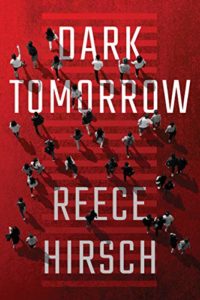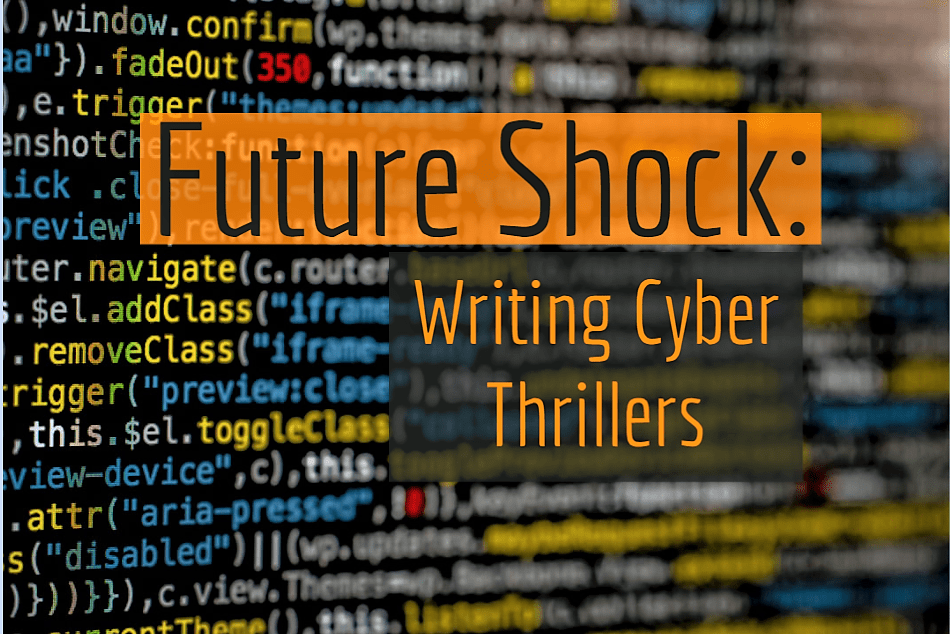The thrillers that I write are often referred to as technothrillers, and that’s a fair description of them. But I’m always a little uncomfortable with that term because technology is so pervasive in our world that I just think of my books as thrillers. Thieves who used to rob banks are now committing theft on a far more massive scale online. Espionage is now as much a matter of hacking and malware as it is tradecraft and dead drops. Writing a “cyber-thriller”–or even a thriller that simply uses technology–has some pitfalls and cliches. But you can avoid them if you know what to watch for.
Here are some lessons I’ve learned (often the hard way) for writing cyber thrillers.
No magic fingers
When hackers are portrayed, particularly in television and movies, there’s often a scene in which the tattooed, goth-looking hacker sits down at a computer and his or her fingers fly over the keyboard. In a matter of minutes, the problem is solved, whether it’s hacking a government database or stealing millions of dollars. Possessing a laptop and hacking expertise does not mean that you have the key to the universe. Try to make sure that the things that the things that the hacker is doing are actually doable. If they are, it never hurts to know (even if you don’t explain it to the reader) how the hack would be accomplished and how long it might take.
All cyber thrillers are really historical novels
No matter how cutting edge your book may be in its use of technology, it will probably look somewhat dated in a year or two. Technology and the devices that we use in our daily lives are constantly evolving and writers should embrace that reality. The more we strive to capture a moment in time, the more it becomes apparent that what we have written is really a type of historical novel. And that’s why the things that give a cyber thriller staying power with readers are the fundamentals – interesting characters, action, smart storytelling.
Get the characters away from the keyboard
One of perils in writing cyber thrillers is having too many scenes where the characters are sitting at the computer keyboard. Those sorts of scenes can be compelling, such as when the protagonist and the villain are engaged in a tense exchange via email, text or video chat, but if they’re overused the book can become static. In crafting a storyline for a cyber thriller it’s important to know going in that much of the action is going to taking place in the real world, and away from the computer.
Use technology to create thrills
When cell phones became commonplace, some thriller writers bemoaned that it was now more difficult to sustain suspense when a person in peril can be warned, or 911 called, with the click of a few keys. And you can’t always place your characters in areas with bad cell reception. I think that new technologies offer just as many ways to heighten suspense. If there’s a recurring theme to my thrillers, it’s “Objects Are Closer Than They Appear.” That warning stenciled on rear view mirrors applies to the Internet and our connected devices. Technology brings us closer together in many positive ways, but also brings bad people and things right to our doorstep – or our inbox. That particularly modern fear that someone (often someone bad) is always watching, always just one click away, provides rich material for thriller writers.
Technology changes but the perils of technology do not
While, as noted above, particular technologies and devices can quickly become outmoded, some technology themes are timeless. Jurassic Park isn’t about the latest advances in genetic engineering, it’s about the dangers of messing with nature – and dinosaurs destroying stuff! If you focus on larger themes and don’t obsess over the wonkish details, your story is more likely to having staying power with readers. For example, in Black Nowhere, I was interested in the story of an online marketplace for illegal drugs not because I wanted to explore the technologies of the Dark Web and TOR encryption. What I found compelling was the way that the hubris of Dark Web entrepreneurs like Silk Road’s Ross Ulbricht paralleled so many other Silicon Valley success stories.
Even if you’re not writing a cyber-thriller, a contemporary novel will certainly use some elements of technology. Career Authors say: you can only use a cell phone battery dying once in your writing career. What pitfalls have you encountered in writing about technology? How did you solve them? Let’s talk about it on Facebook.

 Reece Hirsch is the Thriller Award-nominated author of six thrillers that draw upon his background as a privacy attorney. Reece’s latest is Dark Tomorrow (Thomas & Mercer, May 12), which is the second in his series featuring FBI Special Agent Lisa Tanchik, who investigates cybercrimes. Reece is a partner in the San Francisco office of an international law firm and co-head of the firm’s privacy and cybersecurity practice. For more about his books, visit www.reecehirsch.com.
Reece Hirsch is the Thriller Award-nominated author of six thrillers that draw upon his background as a privacy attorney. Reece’s latest is Dark Tomorrow (Thomas & Mercer, May 12), which is the second in his series featuring FBI Special Agent Lisa Tanchik, who investigates cybercrimes. Reece is a partner in the San Francisco office of an international law firm and co-head of the firm’s privacy and cybersecurity practice. For more about his books, visit www.reecehirsch.com.





